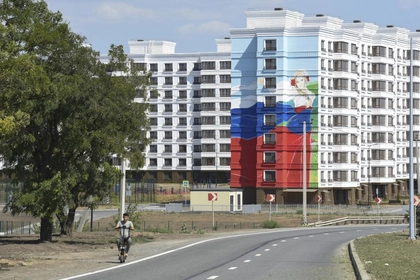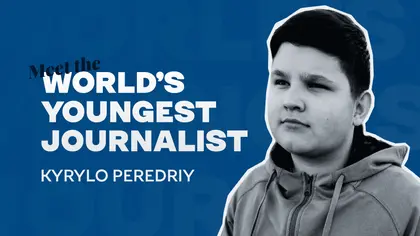Today, the information front is no less important than the frontlines in some respects. Since the start of a full-scale invasion, Ukrainians overwhelmingly began to abandon the consumption of Russian media, giving an impetus to the development of uniquely Ukrainian content.
Among those engaged in Ukraine’s new media is 12-year-old Kyrylo Peredriy, who lives and works in the city of Pokrovsk, in the Donetsk Region.
JOIN US ON TELEGRAM
Follow our coverage of the war on the @Kyivpost_official.
The youngest journalist in the world runs his own YouTube channel called “Cikavo”. Despite his rather young age, Kyrylo invites famous figures in Ukraine to his interviews – and some famous figures have even pursued interviews with him. In his conversations he raises social issues of our time and discusses his most passionate subject – Ukraine’s politics of the day.
During an interview, the Kyiv Post talked to Kyrylo about how, at the age of 12, he creates content that will be viewed by his target audience between the ages of 18 and 35.
How did your career as an interviewer start?
During an evening tea party with my family, I said: “I want to do journalism.” My mom said that one day it would happen. But I said I wanted to do it now.
My parents didn’t take me seriously at first. However, when I started to be successful, they were happy for me.
Then the first person I interviewed was the then-mayor of a nearby town. I just called his personal number and he agreed.

Moscow Imposes Russian Car Insurance in Occupied Ukraine by 2025
What does your day look like now and do you have any assistants?
All the processes I do by myself: from analyzing potential topics to editing the video itself.
So, I wake up at 5:30 in the morning and could be active until nine or ten in the evening, sometimes until 11. Most of my time is spent organizing interviews and preparing for them.
But of course, I also pay a lot of attention to my studies at school.
The number of interviews recently is difficult to estimate. Usually, there are several interviews each week. I also often have work on weekends, but it doesn't cause me any problems. On the contrary, I get even more energy from my work.
How do you choose a guest?
First, I choose those who are interesting to me as a person and whose activities I would like to get acquainted with myself. This is the only way to get cool material because you feel enthusiastic.
However, sometimes PR managers of the guests turn to me with an offer. But I only accept it if I am personally interested in this person.
I record interviews in the so-called home office. And whatever you say, in my opinion, it is more convenient to work in an online format.
It’s better than going mobile. You don’t need to spend time meeting with the interviewee and preparing the technical component of the filming process.
I also want to prove that it is also possible to reveal a person through the video format.
How do you choose a relevant topic?
I have a specific list of topics. But before I invite someone, I search and process all the available information about the guest. My task is to reveal the guest in a way that no one has ever done before.
I say that journalists are like archaeologists. We need to dig up something interesting and unique.
In general, I’m most interested in the occupied or de-occupied territories and the processes that took place there and will continue to take place.
I want to talk to the leaders of the cities that were under occupation. For example, with the mayor of Melitopol, who was in captivity.
Politics is the leading area where I work without interruptions. In fact, I would introduce political science even in schools. Where they would talk about Ukrainian presidents, deputies [lawmakers], the government system, the parliament, and how decision-making takes place.
In addition, I want to concentrate on the topic of restoring the country.
What information from recent interviews are you most satisfied with?
I can give an example of a conversation with [Ukrainian journalist and politician] Dmytro Gordon. That interview was very successful in general. Dmitro was very open with me and told me many things that interested me, including his relationship with Volodymyr Zelensky.
After the de-occupation of Kherson, I conducted an interview with a lawmaker of the Kherson region. In that conversation, there was a lot of exclusive information about the current situation in the city.
I also interviewed the mayor of Kharkiv – he spoke about the life of the city during the heavy shelling.
Do you ask provocative questions?
Yes. And it’s obvious when I touch on a certain topic that the guest doesn’t want to talk about and tries to avoid answering.
To some extent, I’ve already learned to sense their emotions without words by reading a person’s behavior during a conversation.
But unfortunately, I can’t name these people. For the most part, it was all about politics and personal relationships.
What kind of feedback do you get from your audience?
Many times it’s a thank-you message for my work. But, sometimes I get non-constructive criticism.
Some people think that I am just someone’s son, which is why everything works out so easily for me, or they say that someone sponsors me.
And some people write negative things about my appearance. Mostly this is written not in the comments under the video so that everyone can see it, but in private messages.
But, a lot of my guests say that I have interesting questions and I have a certain charisma. My inner circle also says I have a good sense of humor. Maybe it’s true, but I can’t evaluate myself from the outside.
During the interview, each guest needs to find a unique rapport to establish a connection. How do you achieve this?
My personal goal is to sincerely find out what exactly interests this person and their activities. I don’t pursue the goal of creating a resonance or provoking a person.
Perhaps my sincerity is felt by my guest. Then the person relaxes and doesn’t worry there’s some kind of setup in the form of a scandalous video that will be waiting for him.
And, even if there are certain provocative questions, you should leave them for the end – so as not to frighten the person at the very beginning and make them close themselves off.
I also have a journalism teacher. I am very grateful to her, because she motivates me to work on self-improvement.
You are very interested in the life of the country, especially political life. So, what, in your opinion, is the area needing the most reform?
I would like to change the educational system because the future of the country depends on the quality of education.
That is, I would completely restart the educational system and create a new Ukrainian school. In addition, I would add more physical activity, for example, do quick physical exercises with each lesson.
I’m also extremely happy with the ongoing digitalization of the country, including use of the Diia app. I really want this process to continue; and I want to get rid of unnecessary bureaucracy.
As a person who creates content, what can you say about the Ukrainian content that currently exists?
Now we are seeing a positive trend. Since Russian content has left us to a great extent, we have started creating something of our own. This applies to all genres. Especially on YouTube, there’s a wide variety of infotainment content, and I personally really like it.
In your opinion, what is the future of the media?
I think TV will definitely change to be similar to YouTube, but in a way that most channels will actually switch to a different platform.
In addition, Telegram is gaining significant momentum – it is also gradually becoming a kind of media platform replacing traditional television.
You can also highlight the text and press Ctrl + Enter






